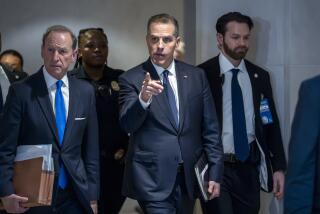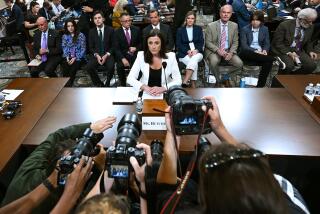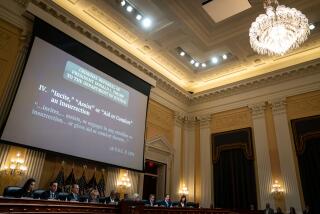Bush Sought to Block 1970 Rights Hearing, Papers Show
- Share via
WASHINGTON — George Bush, apparently fearing a negative impact on his campaign for the Senate against Lloyd Bentsen in 1970, sought White House help in blocking public hearings into employment discrimination in his home district of Houston while he was a Texas congressman, according to records of the Nixon Administration.
White House memos now on file at the National Archives show that aides to then-President Richard M. Nixon expressed sympathy for Bush’s desire to derail hearings by the Equal Employment Opportunity Commission on black and Latino discrimination but decided that the effort would do more harm than good.
The memos reflect general concern among Nixon’s aides that the hearings could cause trouble for Republicans 1 1/2 years into their Administration. At the time, Bush was finishing his second two-year term as a congressman and was about to take on Bentsen in an unsuccessful Senate race that some White House aides predicted would be bitter and hard-fought.
Memo by Nixon Aide
No correspondence or memos on the EEOC question from Bush or his staff could be found among the Nixon papers. But former Nixon aide Peter M. Flanigan, who dealt principally with the business community, said in an April 9, 1970, memo to Bill Timmons, a Washington lobbyist who then was a White House legislative representative:
“As you know, both George Bush and John Tower have urged us to stop the EEOC Houston hearings. I have attempted to do so but unfortunately stopping them could cause us more damage than continuing them.”
Bush, through spokesman Stephen Hart in the vice president’s office, said Wednesday that he had no recollection of the actions reported by the memos. “Based on what we know, we’re just not going to be able to comment on it,” Hart said. He added that Bush “fought for fair housing” when he was in Congress and “has fought for equal opportunity.”
A move to block such hearings, as outlined in the documents, does not appear to raise any question of illegality. Such action would, however, suggest that Bush was placing his personal political ambitions before concerns involving the civil rights of the minority work force in an area that was later determined to be rife with job discrimination.
Hearings Take Place
EEOC files show that the hearings went forward in early June, 1970, and were harshly critical of the performance of big business interests in Houston, the source of much of Bush’s political support. William H. Brown III, then chairman of the commission, said in conclusion that “the picture which has been presented here during the three days of hearings is even worse than what we had anticipated.”
Brown said afterward that similar hearings had been held in Los Angeles and New York but that nowhere in the United States had the commission uncovered greater job discrimination than in Houston, mainly against blacks and Latinos. Among 46 cities ranked on the basis of minority hiring, numbers of jobs available and types of jobs, Houston--despite its economic boom at the time--”in every category ranked 45th or 46th,” Brown declared.
Handles Complaints of Bias
The commission, created by the 1964 Civil Rights Act, handles complaints of job discrimination based on race, religion, sex, national origin or handicap.
In his White House memo reporting Bush’s request, Flanigan said he was attaching another memo, written by then-White House lawyer Leonard Garment, explaining the issue more fully. Garment said in this memo that he had spoken with Brown, a Nixon appointee, about the forthcoming hearings.
Questions Timing
“One can pile up arguments about how the facts warrant an EEOC investigation, how committed the President is to equal opportunity in the jobs sector, and how responsible Bill is personally,” Garment wrote. “One can also pile up counter-arguments on how ill-advised the hearings are in terms of location and especially timing,” he added.
Garment concluded in the memo: “To have the White House attempt to turn them off now would cause an enormously greater ruckus than the hearings themselves might raise.
“Bill (Brown) will discuss agency plans and arrangements with George Bush and with me as they develop. All of us should keep an eye out for problems.”
Garment, in an interview last week, acknowledged that he dealt with civil rights matters for the Nixon White House but said he had no specific recollection of the EEOC episode because “I wrote several thousand memos like that.”
Hart said he had checked with other members of Bush’s staff and could find “nobody who recalls anything” about the EEOC hearings.
‘Don’t Have a Clue’
Flanigan, now a managing director of the New York investment banking firm Dillon Read & Co., said that “I don’t have a clue” about what he meant in writing that he had attempted to stop the Houston hearings.
When asked if he had any recollection of Bush contacting him about the matter, Flanigan said: “Not the least . . . 18 years ago, God, no.
“I know Timmons doesn’t,” he added, explaining that he had checked with his former White House colleague before returning a reporter’s phone call. Timmons said through a spokesman he would not comment on his work for the Nixon Administration.
More to Read
Sign up for Essential California
The most important California stories and recommendations in your inbox every morning.
You may occasionally receive promotional content from the Los Angeles Times.













